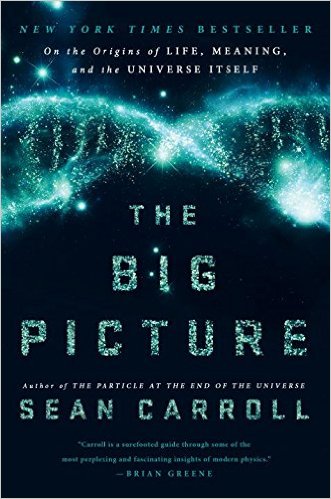Religion
Related: About this forumWhy Is There Something Rather than Nothing?
The Big Picture
On the Origins of Life, Meaning, and the Universe Itself
By Sean Carroll
Published 05.10.2016
Dutton
480 Pages

By Sara Lippincott
SEPTEMBER 23, 2016
UNLIKE MANY of his physicist peers, Sean Carroll welcomes the interest, curiosity, and what must sometimes seem the naïve questions of laypeople. A theoretical physicist and research professor at Caltech, he is also a consummate communicator of science. He tweets and has a widely followed blog, where he has described his work as focusing “on two big themes”: first on “the foundations of quantum mechanics, especially connections to cosmology and emergent spacetime,” and second on the evolution of entropy and complexity. Of the latter he writes:
Part of Carroll’s appeal is that he applies his scientific acumen to subjects closer to the human condition. He continues:
Hence The Big Picture.
This is Carroll’s fourth book. His first, Spacetime and Geometry, an overview of general relativity, appeared in 2003. Most recently, he tackled the Higgs boson in The Particle at the End of the Universe (2012). Even if you’re only peripherally interested in cosmology or particle physics, you will recall the excitement in July of that year when scientists at the Large Hadron Collider at CERN announced that their magnificent machine had finally coughed up the Higgs boson, the carrier of a field that endows our world’s other particles with mass. We would not be here without it, which accounts for its wince-inducing nickname of “the God particle.” Fans of science who watched the CERN press conference on TV will probably never forget the rapturous applause and the sight of 83-year-old Peter Higgs, the eponymous proposer of the field in the 1960s, dabbing his eyes with a handkerchief.
https://lareviewofbooks.org/article/something-rather-nothing/#!
Buckeye_Democrat
(14,853 posts)Loki Liesmith
(4,602 posts)Because nothing cannot be.
rug
(82,333 posts)Loki Liesmith
(4,602 posts)Which would make it something.
The question has no meaning. It's like asking what time the banana is.
rug
(82,333 posts)Loki Liesmith
(4,602 posts)"beyond the edge", or even just "beyond" locates that "something" in space, as being "beyond" something is a spatial property. Therefore it can't be beyond the edge of space.
The phrase contradicts itself.
The problem with these debates: just because we can construct grammatically correct sentences and questions around an idea doesn't mean the idea expressed in those sentences has any content at all.
Similar question: What happened before time?
rug
(82,333 posts)Therefore the answer to your question is what was before rtime is something inherently extranatural, or, if you prefer, supernatural. Because as we all know to date, everything natural has a beginning and an end.
Loki Liesmith
(4,602 posts)"Being" is a property of things that exist. Nothing by definition does not have any properties and therefore does not existence.
Thirties Child
(543 posts)Never did figure it out.
struggle4progress
(118,268 posts)If an answer wouldn't enable us to do something, that we could not do without the answer, then the question has no scientific meaning
muriel_volestrangler
(101,294 posts)... and why it is here, it will instantly disappear and be replaced by something even more bizarre and inexplicable.
There is another theory which states that this has already happened."
Douglas Adams, unsurprisingly.
struggle4progress
(118,268 posts)rug
(82,333 posts)Buckeye_Democrat
(14,853 posts)... I sometimes wonder if there's such a thing as zero-energy information?
The speed limit of light applies to anything with mass/energy, but I don't think it would apply to anything without energy. Physics is so energy-focused, could we be overlooking something?
I was thinking about it while pondering quantum entanglement and "spooky action at a distance." Since energy can be briefly generated from "empty space" per Heisenberg's Uncertainty Principle to create virtual particles and such, I wondered if "zero energy information" could have an influence in that way?
Since it's likely impossible to ever detect anything that has no energy, the idea is probably pointless. Maybe someone could deduce it in an indirect way, though?
rug
(82,333 posts)Brettongarcia
(2,262 posts)Again and again, religious explanations and promises fail. Over and over, science and technology worked a trillion times better than praying for physical miracles.
Given that record? Science is far, far more likely to have the best guesses, than Religion.
Given the very, very high record of success for science, likely the ultimate explanation for things is naturalistic, not supernaturalistic.
cpwm17
(3,829 posts)The fact that there is something rather than nothing is a brute fact of nature. There really isn't a reason why.
rug
(82,333 posts)uriel1972
(4,261 posts)It can imply purpose. How is probably a better word. Once that is nutted out, then we can use why in context if necessary.